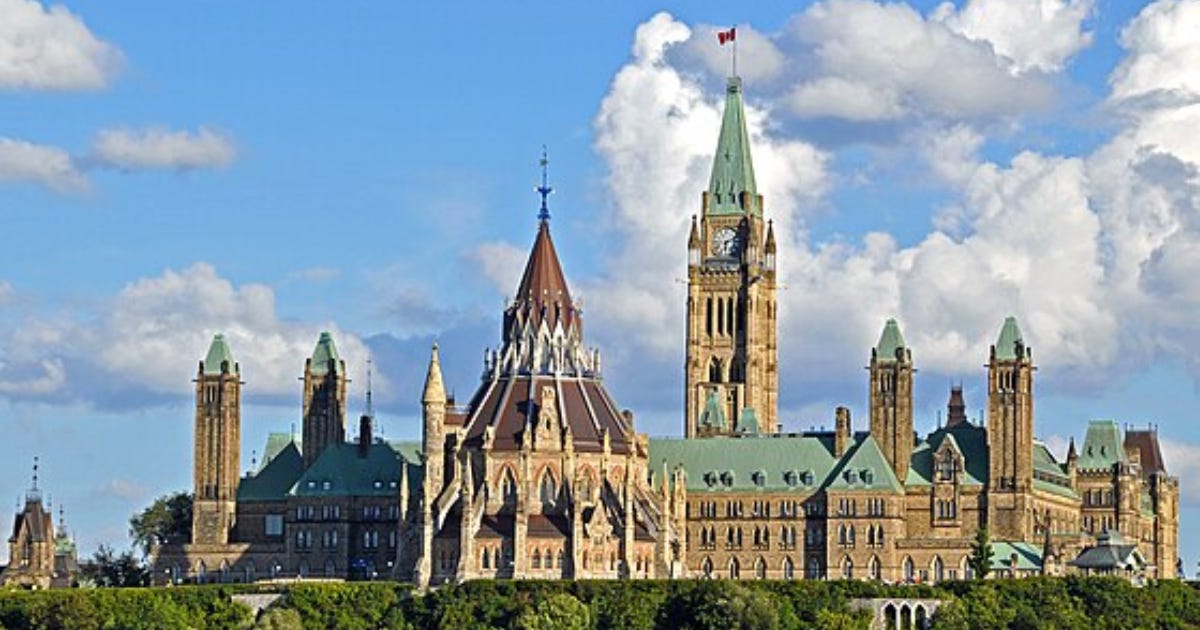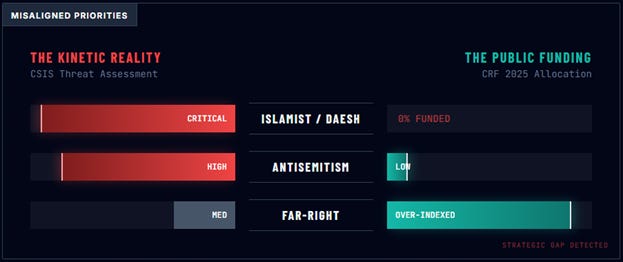Public Safety announces $37 million for counter-radicalization, ignoring Islamist threats
The federal government is pouring nearly $37 million into community projects that “prevent and counter violent extremism,” yet almost none of the money targets Islamist extremism and antisemitism.
The federal government is pouring nearly $37 million into community projects that “prevent and counter violent extremism,” yet almost none of the money targets Islamist extremism and antisemitism, the top threats according to intelligence agencies. Instead, projects tackling far-right extremism are over-represented while leaving the highest-risk ideologies almost entirely untouched.
Public Safety’s latest round of Community Resilience Fund spending supports 19 projects run by universities, non-profits, and municipal partners. The funding was allocated to reduce “hate-motivated crimes” and improve understanding of “radicalization to violence.” But a review of the funded initiatives shows none of the projects address Islamist or jihadist radicalization, and only two mention antisemitism.
Last week, CSIS director Dan Rogers stated that “extreme religious, ideological, or political views persist as one of Canada’s most significant national security concerns.”
The National Security and Intelligence Committee of Parliamentarians and CSIS have said that individuals inspired by “jihadi ideology” remain the greatest terrorist threat to Canada, a conclusion mirrored in CSIS’s 2024 annual report.
That discrepancy prompted a forensic audit by Tafsik, a Toronto-based Jewish advocacy organization. The group carried out a forensic audit of the Community Resilience Fund’s 2025 portfolio, which concluded that the federal program is “structurally blind to the surge in Islamist extremism and anti-Jewish violence that is currently mobilizing youth.”
The audit found that only two of nineteen projects mention antisemitism, despite the spike in antisemitic hate crimes, and none address Islamist or jihadist radicalization. Dan Flatt, Tafsik’s head of research, told True North that the funding gap represents “a dangerous strategic inversion.” He pointed out that while intelligence agencies have disrupted multiple Islamist terror plots targeting Jews in Toronto and Ottawa, “this funding tranche allocates zero resources to specifically countering that ideology.” Several projects focus specifically on far-right extremism despite the absence of any far-right terror plots in Canada during the same period.
“When 40 per cent of hate crimes in major cities target Jews, but 0 per cent of funded projects are dedicated to dismantling the specific theology driving that hatred, the government has created a capability gap that leaves our community vulnerable,” he said.
Since the Hamas attacks of October 7 on Israeli citizens, police in major cities have reported sharp increases in antisemitic harassment, vandalism, intimidation, and physical violence. According to B’nai Brith, 6,219 antisemitic incidents were recorded in 2024, the highest yearly total ever documented.
Flatt said part of the problem stems from Public Safety’s shift toward ideologically neutral terms like “hate,” “polarization,” and “grievance-fueled violence,” which allows the federal government to avoid naming Islamist extremism directly, even when intelligence agencies identify it as the most persistent threat.
Tafsik’s timeline of recent cases includes an Ottawa youth plot involving explosives, a Toronto father-son attack plot inspired by ISIS, and an attempted mass-shooting at a Jewish community centre by a suspect intercepted at the USA-Canada border.
The disconnect is also noticeable in Canada’s border security. An explosive investigation revealed that intelligence services are currently tracking approximately 450 people with “assorted roles” in Hamas who have ties to Canada, a listed terrorist organization and the Palestinian branch of the Muslim Brotherhood. This includes permanent residents and citizens connected to Hamas’ financial and leadership networks.
And last month, Liberal MP Salma Zahid tabled a petition urging Ottawa to grant immigration access to supporters of Jamaat-e-Islami, a Muslim Brotherhood-adjacent political group from Bangladesh that’s engaged in Islamist terrorism.
Meanwhile, pressure is mounting to ease scrutiny of Muslim-led groups. After the National Security and Intelligence Review Agency criticized the Canada Revenue Agency’s terror-financing audits, the National Council of Canadian Muslims and the Canadian Council of Imams claim that Muslim-led charities have demanded that CRA’s Review and Analysis Division—the unit responsible for detecting terror-financing risks—“unfairly and disproportionately targeted” Muslim-led charities and should be abolished because of “systemic Islamophobia.”
Flatt argued that an effective prevention strategy must be aligned with the threat levels identified by intelligence services. That would mean operationalizing the International Holocaust Remembrance Alliance definition of antisemitism to prevent mislabeling mainstream Jewish beliefs as extremism.
“We cannot allow government-funded programs to criminalize normative values held by many Canadian citizens,” he said. “If prevention is going to work, it has to be grounded in reality, not rhetoric.”
Public Safety Canada has not responded to requests for comment.






Recognizing Islamic extremism would be considered "Islamophobic" and then our idiotic government would have to throw hundreds of millions of our tax dollars towards programs designed to tackle the growing problem of Islamophobia. It's lose-lose for Canadians. Imagine when the Islamists make up 10% of our population; England is at around 8% and there are thousands of mosques, many sharia courts, and political parties formed around a pro-Gaza platform. The West is on a suicide mission.
Does believing in a Loving God count as “extreme religious views”. What about celebrating Christmas as a religious event, instead of as a tradition?